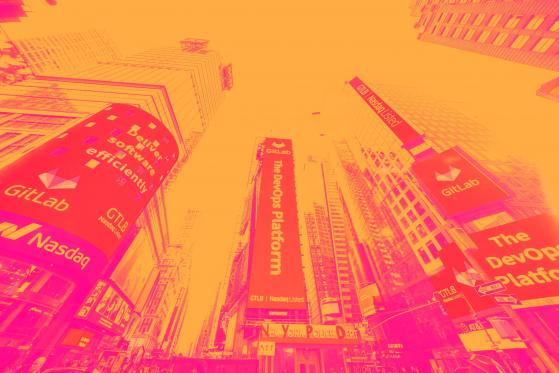Software development tools maker GitLab (NASDAQ:GTLB) announced better-than-expected results in Q2 FY2024, with revenue up 38.2% year on year to $139.6 million. Guidance for next quarter's revenue was also better than expected at $140.5 million at the midpoint, 1.67% above analysts' estimates. Turning to EPS, GitLab made a GAAP loss of $0.33 per share, improving from its loss of $0.40 per share in the same quarter last year.
Is now the time to buy GitLab? Find out by reading the original article on StockStory.
GitLab (GTLB) Q2 FY2024 Highlights:
- Revenue: $139.6 million vs analyst estimates of $129.8 million (7.56% beat)
- EPS (non-GAAP): $0.01 vs analyst estimates of -$0.03 ($0.04 beat)
- Revenue Guidance for Q3 2024 is $140.5 million at the midpoint, above analyst estimates of $138.2 million
- The company lifted its revenue guidance for the full year from $542 million to $556 million at the midpoint, a 2.58% increase
- Free Cash Flow of $26.8 million is up from -$11.2 million in the previous quarter
- Net Revenue Retention Rate: 124%, down from 128% in the previous quarter
- Gross Margin (GAAP): 89.5%, up from 87.1% in the same quarter last year
Founded as an open-source project in 2011, GitLab (NASDAQ:GTLB) is a leading software development tools platform.
As Marc Andreessen says, "software is eating the world" which means the volume of software produced is exploding. But building software is complex and difficult work which drives demand for software tools that help increase the speed, quality, and security of software deployment.
Sales GrowthAs you can see below, GitLab's revenue growth has been exceptional over the last two years, growing from $58.1 million in Q2 FY2022 to $139.6 million this quarter.
Unsurprisingly, this was another great quarter for GitLab with revenue up 38.2% year on year. On top of that, its revenue increased $12.7 million quarter on quarter, a very strong improvement from the $3.97 million increase in Q1 2024. This is a sign of acceleration of growth and great to see.
Next quarter's guidance suggests that GitLab is expecting revenue to grow 24.4% year on year to $140.5 million, slowing down from the 69.1% year-on-year increase it recorded in the same quarter last year. Looking ahead, analysts covering the company were expecting sales to grow 22% over the next 12 months before the earnings results announcement.
ProfitabilityWhat makes the software as a service business so attractive is that once the software is developed, it typically shouldn't cost much to provide it as an ongoing service to customers. GitLab's gross profit margin, an important metric measuring how much money there's left after paying for servers, licenses, technical support, and other necessary running expenses, was 89.5% in Q2.
That means that for every $1 in revenue the company had $0.89 left to spend on developing new products, sales and marketing, and general administrative overhead. Trending up over the last year, GitLab's excellent gross margin allows it to fund large investments in product and sales during periods of rapid growth and achieve profitability when reaching maturity.
Key Takeaways from GitLab's Q2 Results With a market capitalization of $7.52 billion, GitLab is among smaller companies, but its more than $273.2 million in cash on hand and near break-even free cash flow margins puts it in a stable financial position.
We were impressed by how strongly GitLab blew past analysts' revenue expectations this quarter. We were also glad its adjusted EPS and full-year revenue guidance came in higher than Wall Street's estimates. On the other hand, its net revenue retention fell. However, this declining retention isn't unique to GitLab. We've observed these declines in many software companies this quarter. Zooming out, Gartner (NYSE:IT) (a widely recognized technology advisory firm) recognized GitLab as a category leader in the DevOps space. Lastly, the company appointed Chris Weber, a long-time Microsoft (NASDAQ:MSFT) executive, as Chief Revenue Officer. The stock is up 6.35% after reporting and currently trades at $52.97 per share.
The author has no position in any of the stocks mentioned in this report.
